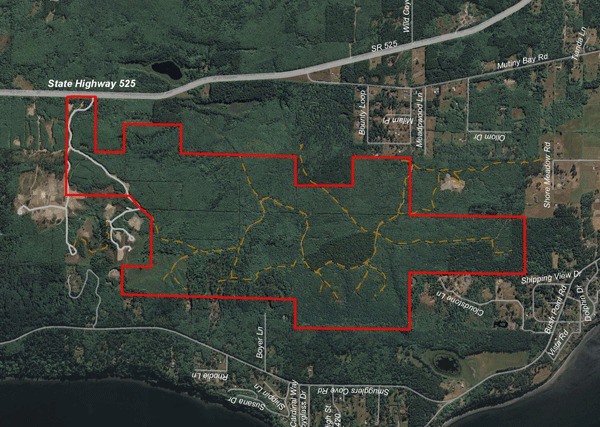The Whidbey Camano Land Trust had been hoping to make history today by becoming the new owner of the fabled Trillium property in South Whidbey.
But it appears history will have to wait another week.
The conservation group was expecting to close with three Snohomish County banks for the 664-acre tract of forest between Greenbank and Freeland Wednesday, Sept. 22. However, some last minute but essential details have stalled the finalization of the deal, according to Pat Powell, executive director for the land trust.
“Closing can be complicated,” she said in interview Wednesday morning. “We’re hoping it will happen next week.”
Powell assured that the land deal was still “going to happen.” The delay is the result of issues common to large land deals, such as the obtainment of title signatures. Powell expects to close no later than next Wednesday, Sept. 29, although it could happen even sooner, she said.
The Trillium property, the biggest single-owned piece of forestland left on the island, has been under threat of development for about 30 years. Three Snohomish County banks came into possession of the property late last year after the developer defaulted on two loans.
The land trust was presented with an opportunity to buy the property this past February, which began a frantic dash to raise $4.2 million over seven months. It’s believed to be the largest fundraising effort of its kind in the island’s history. The successful effort is nothing short of amazing, said Elizabeth Guss, director of outreach and development in a recent news release.
“It’s over the top,” Guss said. “But if this was going to happen anywhere, it was going to happen here. This is the Whidbey culture—community rallying to protect a treasure.”
Powell said she had her doubts when they began the fundraising effort back in February, calling it a “long shot.” But the land trust was committed to try, and the effort paid off with more than 1,400 donations ranging in scale from $300,000 to $5. A larger donation was confirmed, but Powell said the identity of the donor and the amount was anonymous.
However, the fundraising effort has been something of a roller-coaster ride. The land trust missed the original deadline, set for June 10, when it came up short by $1.8 million. The banks granted a 90-day extension but the group was short again just days before the new Sept. 10 deadline.
In fact, the land trust never made the final goal. To close the deal, it took out a low-interest $200,000 loan with the Bullitt Foundation, a nonprofit group dedicated to environmental health in the Northwest. Conditions of the loan require that it be paid off within four years, with the collateral being another property owned by the land trust.
Considering how much has been raised in the past seven months, Powell said she is not concerned about a four-year deadline. She expects it will be paid off entirely by the end of 2011, which will give them time to complete a management plan and conservation easement that will preserve the property in perpetuity.
Once all of that is finalized, ownership of the forest will revert to Island County. However, due to the county’s financial problems, the land trust will continue fund management and maintenance of the property.
“We’re not going to just turn it over and walk away; we wouldn’t do that,” Powell said.
The details will be included in the management plan, a document that will address a range of issues ranging from property care to trails and uses. For example, it will tackle the tricky issue of hunting. No decisions have been made yet, but deer hunting is being considered as a wildlife management tool. It’s a charged issue, said Powell, and will have to be carefully considered.
The management plan will be developed over the next six to nine months by an advisory committee consisting of representatives from Island County, the land trust and the public. According to Powell, the process will include several public meetings so that citizens can weight in.
In the immediate future, the land trust is considering a name change for the forest. How that will be done exactly is still being hammered out, however, and is of course contingent on closure of the land deal.
“We can’t name it until we own it,” Powell said.



